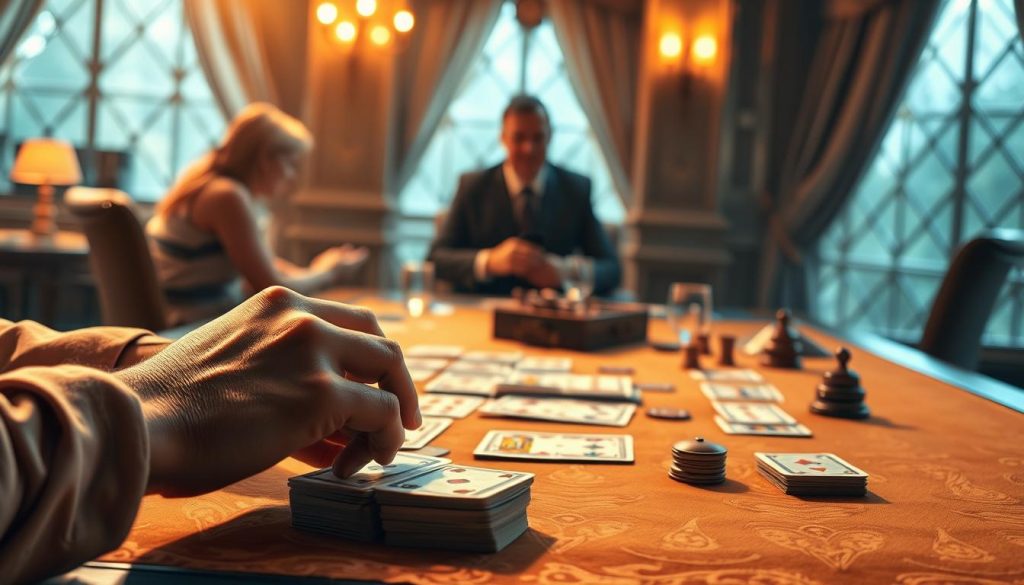Bridge is a complex card game that needs smart thinking, clear communication, and deep analysis. To get better, players must learn about bridge strategy and card game tactics.
Winning at bridge isn’t just about luck. Top players spend a lot of time learning new techniques, understanding their partners, and mastering bidding systems. This article will show you how to become a strong bridge player.
We’ll cover key parts of bridge, like basic rules, advanced bidding, hand evaluation, and defense. These tips will help both new and experienced players improve their game.
We’ll talk about reading partner signals and handling tournament pressure. You’ll learn the skills that make great bridge players. Get ready to improve your bridge game and become a winner at the table.
Understanding Bridge Fundamentals for Success
Bridge is a complex card game that needs strategic thinking and clear communication. Knowing the rules well is key for success. Every part, from rules to communication, is important.
Learning bridge takes time and effort. Players work together, trying to win tricks and meet contract goals. The game’s scoring and partner talk are its main challenges.
Essential Bridge Rules and Gameplay Structure
Bridge uses a standard 52-card deck and has four players in two teams. The game has two main parts:
- Bidding phase: Partners talk about their hand strength and chances.
- Playing phase: They try to win tricks and meet the contract.
Contract Bridge Scoring Dynamics
Scoring in contract bridge is key to playing well. Points are given for:
- Winning the contract
- Winning extra tricks beyond the contract
- Bonus points for big wins
Partnership Communication Techniques
Good communication between partners is crucial. They use bidding and card play to share important hand info. A shared language helps win games.
By focusing on these basics, players can start to get better at bridge. Keep learning and practicing to improve your skills.
Bridge Card Game Strategy: A Comprehensive Guide

Mastering bridge game strategy is a mix of skill, communication, and smart thinking. Top players know it’s more than just knowing the rules. They turn simple hands into wins with their tactics.
Key elements of a winning bridge game strategy include:
- Precise hand evaluation
- Strategic partnership communication
- Probability assessment
- Offensive and defensive play balance
Good card game tactics start with knowing your partner’s signals. Successful players read these cues well. They make smart moves that help their team score more.
Bridge strategy isn’t about being perfect. It’s about making the best choices with what you have. Probability is key in making these decisions. Players must quickly weigh risks and choose the best move for each hand.
Experienced players spend time studying and practicing. They learn the game’s complex strategies. The best teams work together, relying on trust and good communication as much as skill.
Mastering the Art of Bidding in Bridge
Bridge bidding strategy is key to winning. Good players know how to talk through bids. This lets partners share important info about their hands.
To get better, you need to practice and learn the basics. You must quickly figure out your hand’s strength. Then, you need to tell your partner with clear bids.
Opening Bid Techniques
Knowing how to start is important in bridge. Good opening bids show what your hand can do. Here are some tips:
- Count your hand’s points well
- Find your longest and strongest suit
- Choose the right bid level
- Use bids to show your hand’s strength
Responding to Partner’s Bids
Good responses can turn a weak hand into a win. Pay close attention to your partner’s first bid. Then, answer in a way that clearly shows what you have.
Advanced Bidding Conventions
Top players use special bidding tricks to get ahead. These methods let partners share more detailed info than just points.
- Stayman Convention
- Jacoby Transfer
- Blackwood Convention
- Unusual No Trump
Learning these advanced bids can make you a pro. Keep practicing and talking with your partner to get better at bridge.
Essential Bridge Hand Evaluation Skills
Mastering bridge hand evaluation is key to being a great player. It’s not just about counting points. Good players see the potential in their hand in a deeper way.
Key parts of bridge hand evaluation are:
- High-card point assessment
- Distribution evaluation
- Suit quality analysis
- Potential for trick-taking
Good players know how to find hidden strengths in their cards. They use their experience to see beyond simple points. The real value of your hand depends on many things, like suit length and how well your cards work together.
Some important strategies for card analysis are:
- Count both high-card points and distribution points
- Assess suit quality and potential winners
- Consider hand shape and flexibility
- Evaluate potential blocking or defensive capabilities
Practice is the best teacher in bridge hand evaluation. Every hand is a puzzle to solve. By getting better at analyzing hands, players can turn average hands into winners.
Defensive Play Techniques That Win Games
Bridge defense is key to being a great player. It needs practice, watching closely, and talking well with your partner. Good defenders can win games by using the right techniques.
Defensive play in bridge is an art. It involves many strategies to stop the declarer. Players must get better at reading signals and working together.
Reading Opponent’s Signals
It’s important to spot defensive signals early. Players should:
- Watch card discards closely
- Notice changes in suit follow
- Understand partner’s lead choices
- See when to talk to partner
Defensive Card Placement
Where you play your cards matters a lot. Defenders should:
- Count the declarer’s tricks
- Stop suits from growing
- Block entry points
- Keep talking to partner
Partnership Defense Coordination
Good partnership defense needs teamwork and clear signals. Practice together and agree on signals to use.
Advanced Declarer Play Strategies

Mastering declarer play is more than knowing cards. It’s about using smart strategies to win. Good players become great by knowing how to use their cards well.
Top bridge players use clever tactics to control the game. They focus on a few key things:
- Strategic entry management
- Precise timing of card plays
- Psychological deception techniques
- Calculated risk assessment
Entry management is key. Players plan different paths through their hand. This lets them control the game and adjust to changes.
Deceptive play is also important. Declarers aim to confuse defenders. They use card sequences and pauses to make mistakes, gaining an edge.
Improving takes practice and a desire to learn. Bridge is always evolving. Even pros can get better and find new ways to win.
Bridge Tournament Success Tips
Winning at bridge tournaments is not just about playing cards. Top players know it’s about strategy, mental prep, and managing time well. They face tough challenges in tournaments, pushing them to their best.
Preparation and Mental Focus
Getting ready for tournaments is key. Players need routines to calm their nerves and focus better. Here are some mental prep tips:
- Practice meditation and breathing exercises
- Visualize successful game scenarios
- Develop a positive, resilient mindset
- Create a personalized mental warm-up routine
Time Management During Play
Good time management is what sets top players apart. They make smart choices quickly and play efficiently. This way, they can think deeply without losing time.
- Set internal time limits for critical decisions
- Practice quick yet accurate card reading
- Develop a consistent pace of play
- Learn to recognize when to trust initial instincts
Managing Tournament Pressure
Tournaments can be very stressful. But, experienced players know how to handle it. They stay calm and think clearly, even when it matters most.
Common Bridge Mistakes to Avoid

Bridge players at all levels face tough moments. These can lead to big mistakes. It’s key to know and avoid these errors to get better and stay competitive.
Preventing mistakes starts with spotting common pitfalls. Players often struggle with three main areas:
- Bidding miscommunications
- Strategic misinterpretations
- Defensive play misjudgments
In bidding, many make big mistakes. They misread partner’s signals or think their hand is stronger than it is. Good communication and clear bidding rules can cut down these errors a lot.
Defensive play is another area where mistakes happen. Players often pick the wrong cards or miss what the opponent is doing. Getting better at watching and understanding your partner’s defense can help avoid these mistakes.
- Practice active listening during gameplay
- Study standard bidding protocols
- Review hand analyses with experienced players
- Develop consistent partnership communication
Bridge needs constant learning and getting better. By knowing where mistakes can happen and using strategies to prevent them, players can do better and have more fun.
Bridge Etiquette and Table Presence
Knowing bridge etiquette is as important as knowing the game itself. Good manners make the game fun for everyone. It’s not just about being polite; it’s about being professional and friendly.
There are a few key things to remember about bridge etiquette:
- Stay calm and composed
- Don’t make negative comments
- Respect everyone at the table
- Keep talking to a minimum
- Be careful with cards and materials
At the bridge table, clear communication is key. Talk clearly and briefly with your partner. Body language and nonverbal signals are important too. Try not to show frustration or disappointment.
Managing time well is also important. Make decisions quickly and avoid delays. If you make a mistake, own up to it and keep going. Everyone is learning and getting better.
Great bridge players are skilled and have good manners. Being respectful makes you a better player and helps build a positive community.
Building a Winning Bridge Partnership
To win at bridge, you need to work hard, talk well, and practice a lot. The best teams know each other’s strengths and weaknesses. They trust each other and talk smoothly at the table.
Good communication is key to winning at bridge. Players must learn a special way to talk and signal. This includes:
- Consistent bidding conventions
- Non-verbal signaling techniques
- Mutual understanding of strategic approaches
Communication Methods
To build a strong partnership, you need clear ways to talk. Partners should agree on bidding and play signals. They should also talk about strategies and review games often.
Practice Routines
Practicing together is important to get better. Here are some good practices:
- Regular joint practice sessions
- Analyzing previous game performances
- Studying complex bidding scenarios together
- Participating in local bridge clubs or online tournaments
Partnership Agreement Essentials
A written agreement is important. It should cover bidding, defense, and what to expect. This agreement helps avoid mistakes and strengthens teamwork.
Online Bridge: Modern Playing Techniques
Digital card games have changed bridge, making it easier to play and compete online. Online bridge strategy is key for players wanting to play more than just in-person games. Sites like Bridge Base Online and Real Bridge have created online communities where players can play against others worldwide.
Playing online bridge means learning new ways to play. Players need to get used to digital tools and how to use them fast. The top players know how to make quick decisions and play cards well, even with less time than in-person games.
Technology has made bridge training and competitions easier. Now, players of all levels can play in tournaments online, no matter where they are. Advanced players can use tools to analyze their games and get better, something hard to do in person.
To do well in online bridge, you need to be good with technology and cards. Learning these modern ways to play opens up new chances to learn, compete, and meet other bridge fans. It changes how we enjoy this classic game.

